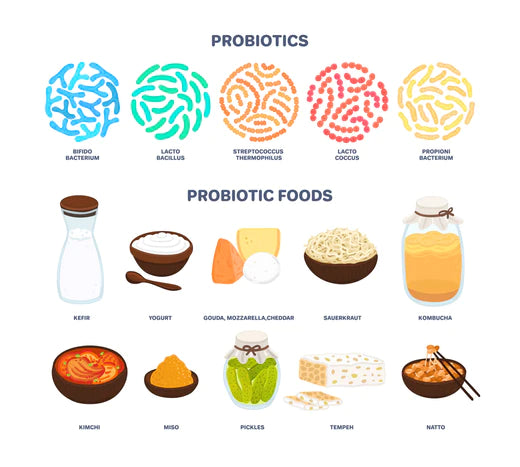Probiotic foods health benefits
Over the past few years these questions might sometimes came up in your conversation, what is probiotics good for, benefits of taking acidophilus daily, what good are probiotics for you.
The world Health and other health organizations has been obsessed with probiotics for over the last decade. So much research and investment has gone into developing and testing out different strains, to know the benefits of good bacteria in gut, probiotic effects, side effects of taking probiotics daily, benefits of live active cultures, do probiotics boost immunity and how they modulate our microbiome and protect the all-important gut environment.
Types of probiotics
Types of probiotics commonly include bifidobacteria and lactobacillus, and less commonly lactococcus, streptococcus, and enterococcus. Saccharomyces is beneficial yeast strain that is also commonly found in probiotic supplements.
Common strains you’ll see in probiotic supplements and probiotic-enriched foods include:
- L. acidophilus
- L. casei
- L. gasseri
- L. plantarum
- L. reuteri
- L. rhamnosus
- B. bifidum
- B. breve
- B. infantis
- B. longum
- Lactococcus lactis
- Streptococcus thermophilus
- Saccharomyces cerevisiae (boulardii).
Soil-based probiotics
Some of the top probiotic foods are soil-based probiotics, they have been touted as superior to other probiotics due to their survivability through the stomach and small intestine as well as their sourcing from nutrient-rich soil, where we naturally should be getting our probiotics from. The food we consume however, because our soils are often depleted of living microbes and nutrients and our food commonly travels far distances from the field to our plates, we don’t get exposed to these organisms as often as we should.
Soil-based probiotics form spores, that are able to resist the harsh acidic environment of your stomach and make it all the way to your colon, where they can actually go to work making those beneficial postbiotics for you.
There’s no definitive answer on whether soil-based probiotics are better or worse for you. As with so many health products, the response is individual. One person may respond well to a soil-based probiotic, while another may have GI-related side effects like bloating. It simply takes experimentation to find the best time to take probiotics, health balance complete probiotic benefits, what type of probiotic is best for, benefits of taking probiotics everyday and the probiotics benefits and side effects if any.
If you are immunocompromised or already dealing with significant health issues, you may be better off focusing on eating foods that work for you to increase the probiotics in your gut.
Probiotic foods
Then there are certain foods we can eat that already contain the beneficial probiotics we need. These are fermented foods such as:
- Yogurt
- Kefir
- Kimchi
- Sourdough
- Sauerkraut
- Kombucha
- Raw cheese
- Miso
- Tempeh.
What probiotic foods are in your diet? And probiotic foods health benefits.
Health benefits of probiotics
Probiotics have been well-studied. The health effects of probiotics on the skin, benefits of taking probiotic supplements, benefits of probiotics for stomach, what is acidophilus good for and weight loss foods that have good bacteria and other health benefits for many other different conditions as well as general health.
One study found that a combination of multiple strains of probiotics significantly improved blood pressure control. Probiotics have also been shown to be able to modulate the immune system and give microbiome-related benefits IBS bowel support for diseases like IBS and IBD. They may directly combat pathogenic bacteria or simply work to balance out the distribution of microbes in the gut and enhances benefits of good bacteria, allowing for better digestion and lowering inflammation.
Probiotics have many health benefits, and we will likely continue to discover more uses for them in the coming years.

